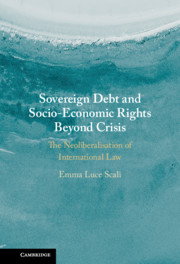Book contents
- Sovereign Debt and Socio-Economic Rights Beyond Crisis
- Sovereign Debt and Socio-Economic Rights Beyond Crisis
- Copyright page
- Dedication
- Contents
- Figures
- Tables
- Foreword
- Acknowledgements
- Table of Cases
- Table of International Treaties and Other Instruments
- Abbreviations
- 1 Introduction
- 2 Sovereign Debt and Neoliberalism
- 3 Economic and Social Rights and Neoliberalism
- 4 Sovereign Debt and ESR in Greece (2009–)
- 5 Conclusions
- Bibliography
- Index
3 - Economic and Social Rights and Neoliberalism
Published online by Cambridge University Press: 24 February 2022
- Sovereign Debt and Socio-Economic Rights Beyond Crisis
- Sovereign Debt and Socio-Economic Rights Beyond Crisis
- Copyright page
- Dedication
- Contents
- Figures
- Tables
- Foreword
- Acknowledgements
- Table of Cases
- Table of International Treaties and Other Instruments
- Abbreviations
- 1 Introduction
- 2 Sovereign Debt and Neoliberalism
- 3 Economic and Social Rights and Neoliberalism
- 4 Sovereign Debt and ESR in Greece (2009–)
- 5 Conclusions
- Bibliography
- Index
Summary
This Chapter critically reviews the existing international law on economic ad social rights, namely the International Covenant on Economic, Social and Cultural Rights (ICESCR), and it outlines existing standards on sovereign debt and human rights. Considering the surviving peculiarities of the ICESCR (due, inter alia, to the historical contingencies that influenced its elaboration in the 1950s-60s) and the nature of the economic and fiscal policy measures that have been generally recommended over the years by its monitoring body, the UN Committee on Economic, Social and Cultural Rights (CESCR), this Chapter challenges the purported economic neutrality of the Covenant (and, more generally, of the international ESR regime) as currently interpreted. Furthermore, it highlights the increased influence of neoliberalism on this legal framework’s post-crisis developments, especially the more recent (re)interpretation by the CESCR of the prohibition of retrogressive measures.
Keywords
- Type
- Chapter
- Information
- Sovereign Debt and Socio-Economic Rights Beyond CrisisThe Neoliberalisation of International Law, pp. 62 - 102Publisher: Cambridge University PressPrint publication year: 2022

